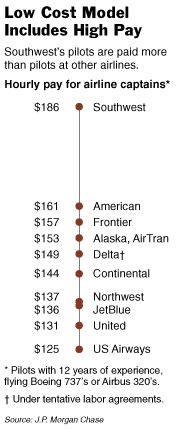Capitalist tales and workers success

The New York Times has an interesting article regarding the employees who helped start Southwest Airlines. Normally I would mention it briefly, point out some interesting points and then let you use the link to read it yourself. But this paper very quickly removes items of interest and then wants to charge several dollars to read it in the future. (Their premium content is one reason their columnists don't exist on this blog. Which doesn't mean they don't have the right to do it just that we don't use them as a result.)
The article is about some of the 17 original employees who went to work for Southwest. Now Marxists argue that labour is inherently exploited by the capitalists. Of course in much of the modern world labourers are capitalists. And that is the case for Southwest. The company had no pension scheme but had a profit sharing scheme where employees could receive shares in the company and become part owners. So how did hey do?
The paper reports that Mike Mitchel collects boarding passes for Southwest . Over the years he accumulated over 80,000 shares of the company valued at more than $800,000. He has also reinvested his income over the years so that now those shares are only about a quarter of investment portfolio. The paper wonders why these employees are still there when so many of them could retire without ever having a financial worry again. "But for Mr. Mitchel and his Southwest colleagues from the first days — eight flight attendants, five operations workers and four executives, each a millionaire — it is not about the money. Ask them why they stick around and they mention frugality and pride in earning their keep. And they say they simply like to work."
When Southwest was formed it took four years before it could fly. Other airlines sued and tried to use the then heavy regulations to stop the company. These where regulations which politicians assured us were there to protect "the consumer" from being exploited by the airlines. But the airlines loved the regulations as they kept competition down and the airlines hated competition. And in Southwest's case they had reason to fear. Southwest did a better job at lower prices and the result is that many major competitors went under unable to offer the same to consumers who benefitted from the lower fares.
Southwest employees work harder and are more productive than others in the industry. One result is that it has some of the lowest costs of any airline. But as the Times notes: "it now pays the highest wages to many worker groups, making up the difference with higher productivity and by holding down its costs in a number of ways. Its planes fly longer hours and sit at the gate for fewer minutes." It notes that a flight attendant for the airline could make more than $100,000 per year if they wish. Unite Airlines attendants can expect a maximum of half that. And all the original flight attendants for Southwest are now millionaires. One of those attendant, Sandra Force, left her job teaching for Southwest. Her parents thought she made a mistake. Her profit sharing has given her over 100,000 shares of the company valued today at over $1.6 million. And at 61 she still works as a flight attendant. She says: "I love to work."
So in a nutshell: Southwest started with nothing and had to fight to get into the then heavily regulated industry. It beat the crap out of the competitors. It is unionised but workers feel free to ignore union regulations. It broke the rules, employees were allowed to have fun at work (including attendants who had competitions to see how many passangers could fit in the loo), work all they wanted and were rewarded for doing so. Pay is among the highest in the industry and so are the profits and this is do to greater productivity and efficiency. And now the "lowly" workers including attendants and mechanics who stuck with the company are millionaires.
The company is unionised but one worker says they are not bound by union rules like some companies. "If you saw something that needed to be done, and you thought you could do it, you did," said one worker.
 DiggIt!
DiggIt! Reddit
Reddit Del.icio.us
Del.icio.us

<< Home